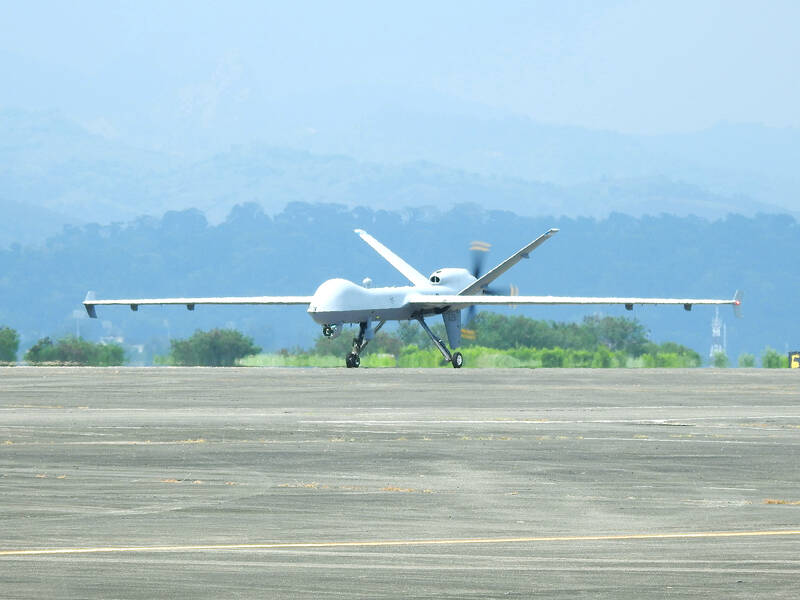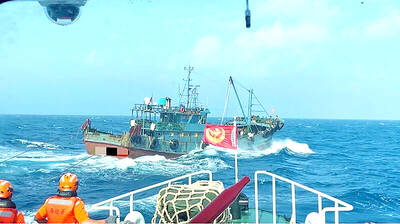The Ministry of National Defense yesterday said that it has purchased four General Atomics MQ-9 Reaper drones from the US.
The drones would be handed over to Taiwan in the US in the second half of 2025 and their equipment would be delivered by the first half of 2027, Minister of National Defense Chiu Kuo-cheng (邱國正) said, adding that drone operators would undergo six months of training.
Chiu made the announcement while briefing the legislature’s Foreign Affairs and National Defense Committee on the progress of the military’s procurement of fighter jets and weapons.

Photo: CNA
TWO BATCHES
Lee Shih-chiang (李世強), head of the ministry’s Department of Strategic Planning, said the drones — which cost NT$21.7 billion (US$707.62 million) — would be delivered in pairs in two batches, adding that drone operators would be trained in the US.
“We originally hoped that the entire training process could be carried out in Taiwan, but the required training modules and venues cannot be fully replicated in Taiwan without incurring great cost,” he said.
COMBAT ADVANTAGE
The Reapers would give the military a significant combat advantage, as they would provide a data link allowing real-time information sharing with the US, he said, adding that this would create a collaborative combat environment and assist the US in making precision long-range strikes.
Meanwhile, Chiu said that Taiwan would not receive financial compensation for a nearly one-year delay in the delivery of F-16V jets purchased from the US.
Speaking with reporters on the sidelines the legislative meeting, Chiu said that the contract signed with Washington does not include financial penalties for late delivery.
However, the US has promised to provide F-16V spare parts and logistics accessories ahead of schedule due to the delay, Chiu said, without elaborating.
Chiu said that, for the time being, the air force needs to increase its fighter jet availability on its own.
In the meantime, the ministry would ask the Ministry of Foreign Affairs, Taiwan’s defense mission in Washington and the American Institute in Taiwan to help speed up the jets’ delivery from Lockheed Martin, Chiu said.
Despite the delay, Taiwan is to receive all 66 fighter jets before the end of 2026 as scheduled, the defense ministry said.
In addition to the 66 new F-16Vs, Taiwan began a program in 2016 to retrofit all of its existing 140 F-16A/Bs into the more advanced F-16V format, which is expected to be completed later this year.
Chungshan Institute of Science and Technology president Art Chang (張忠誠) told lawmakers at the meeting that the institute is considering turning retired F-5 trainers into uncrewed aerial vehicles or target drones.
Taiwan has been building its own “Brave Eagle” advanced jet trainers to replace the aging F-5 jets.

The Ministry of the Interior (MOI) is to tighten rules for candidates running for public office, requiring them to declare that they do not hold a Chinese household registration or passport, and that they possess no other foreign citizenship. The requirement was set out in a draft amendment to the Enforcement Rules of the Public Officials Election and Recall Act (公職人員選舉罷免法 ) released by the ministry on Thursday. Under the proposal, candidates would need to make the declaration when submitting their registration forms, which would be published in the official election bulletin. The move follows the removal of several elected officials who were

The Republic of China (ROC) is celebrating its 114th Double Ten National Day today, featuring military parades and a variety of performances and speeches in front of the Presidential Office in Taipei. The Taiwan Taiko Association opened the celebrations with a 100-drummer performance, including young percussionists. As per tradition, an air force Mirage 2000 fighter jet flew over the Presidential Office as a part of the performance. The Honor Guards of the ROC and its marching band also heralded in a military parade. Students from Taichung's Shin Min High School then followed with a colorful performance using floral imagery to represent Taiwan's alternate name

COGNITIVE WARFARE: Chinese fishing boats transmitting fake identification signals are meant to test Taiwan’s responses to different kinds of perceived incursions, a report said Chinese vessels are transmitting fake signals in Taiwan’s waters as a form of cognitive warfare, testing Taipei’s responses to various types of incursions, a report by the Institute for the Study of War said on Friday. Several Chinese fishing vessels transmitted fake automatic identification system (AIS) signals in Taiwan’s waters last month, with one mimicking a Russian warship and another impersonating a Chinese law enforcement vessel, the report said. Citing data from Starboard Maritime Intelligence, the report said that throughout August and last month, the Chinese fishing boat Minshiyu 06718 (閩獅漁06718) sailed through the Taiwan Strait while intermittently transmitting its own AIS

CHINESE INFILTRATION: Medical logistics is a lifeline during wartime and the reported CCP links of a major logistics company present a national security threat, an expert said The government would bolster its security check system to prevent China from infiltrating the nation’s medical cold chain, a national security official said yesterday. The official, who wished to stay anonymous, made the remarks after the Chinese-language magazine Mirror Media (鏡周刊) reported that Pharma Logistics (嘉里醫藥物流) is in charge of the medical logistics of about half of the nation’s major hospitals, including National Taiwan University Hospital and Taipei Veterans General Hospital. The company’s parent, Kerry TJ Logistics Co (嘉里大榮物流), is associated with the National Committee of the Chinese People’s Political Consultative Conference (CPPCC) and the Chinese People’s Liberation Army (PLA), the